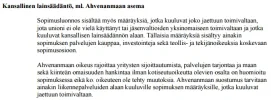What I DIDN’T read
Katja Kipping was one of the first German MPs to gain access to the new TTIP reading room opened in Berlin this week, and she has written up a report of her experience. We thought it was well worth translating from the original, ‘The Opposite of Trans
Now, I am not allowed to tell you anything about the text that I read. But I never signed anything to say that I can’t reveal what I DIDN’T read.
Sigmar Gabriel, Minister for Economic Affairs and a top cheerleader for TTIP. Given that Sigmar Gabriel claims that TTIP is going to be of particular benefit for small and medium-sized enterprises in Germany, I was naturally curious to read what the documents had to say about them. For the record: I read nothing that even vaguely supported Gabriel’s claim.
Main objective of the EU negotiators in the TTIP talks, namely: access to the massive procurement contracts of the USA. The complex tendering processes involved are not the usual stamping ground of small businesses, either here or there.
Yet afterwards I realised that nothing I had read would make me rethink any of my previous criticisms of TTIP.
I read nothing to alleviate my concern that the US side wishes to make life more difficult for public and community enterprises and to secure better terms for transnational corporations in the battle for public tenders.
I also read nothing to calm my fears that EU negotiators are prepared to sacrifice our social and environmental standards for the prospect of winning lucrative contracts for big European firms.
I read nothing that would lead me to reconsider my previous criticism that consumer protection plays no part in TTIP other than to proclaim free market competition to be the highest form of consumer protection that exists.
The US side has assured the EU that there will be no restriction on its ability to introduce ‘science-based regulations’ in future. But the USA considers large parts of the EU’s food safety regime not to be ‘science-based’, so a resourceful trade barrister could make use of the clause in question to launch a successful lawsuit against those food safety regulations.
For us MPs to have a proper understanding of the potential significance of the terms used, we’d need not only to have the full text of TTIP but also to get all the wording checked by international trade lawyers, and these are precisely the people we are not allowed to have in the room with us.
Now I’d always thought that elected MPs have a right to information. Yet the TTIP negotiators (and who gave them their legitimacy?) reckon they are GRANTING us access out of the goodness of their hearts. Access as a sign of exceptional trust. Whoever wrote that – did they really think that we MPs would feel flattered? To me it smacks more of totalitarianism. ‘Granting access’ and ‘extending trust’ is not the language you use if you really believe in democracy.






 Haisee maanpetokselta koko touhu.
Haisee maanpetokselta koko touhu.
